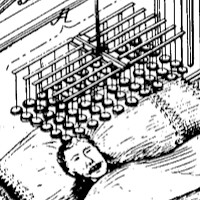Caligula Becomes Principate - March 28

The Roman Empire lasted a rather long time, as far as empires go. From well before the time of Christ to well after, Rome ruled the known world. Shortly after the death of Christ in Jerusalem, one of the most infamous leaders came into power. In fact, Gaius Julius Caesar Agustus Germanicus, better known as Caligula, came into power on 16 March, AD 37. The Roman line of succession was a bit fuzzy, to use the technical term. Basically, Julius Caesar died and was succeeded by Caesar Agustus (Octavius). Agustus, however, only had one child—a daughter. And that is about the point that the Julio-Claudian Dynasty becomes shaky. Suffice it to say, none of the succeeding rulers were truly related by blood.
At any rate, Tiberius was the successor to Augustus and his adoptive grandson was Caligula. Upon Tiberius’ death, Caligula ascended to the throne of Rome. He was beloved by everyone. According to some historians, he was loved by everyone in the known world. They welcomed him joyously to the throne with such titles as “our baby” and “our star.” Why was he initially so popular? His father, Germanicus, had been a great military hero. Tiberius, the former Emperor, had not been quite so popular. The fact that Caligula wasn’t Tiberius made the people quite happy—it would be like saying that people love Obama because he’s not Bush.
Two years into his reign, Caligula fell ill. During that time—whether imagined or not—several people allegedly conspired against him. When he made a full recovery, he ordered the execution of several people, and forced a few of his family members to commit suicide. Thus began the cruelty and seeming insanity that plagued Caligula’s short reign.
The Empire began to fall into a bit of a demise. Caligula spent state funds lavishly on himself and his indulgences, then made certain of the nobles pay for the misuse. He would convict and execute people for the sole purpose of seizing their estates to fund the depleted treasury. In 38, the financial status of Rome began to plummet into depression. By 39, a famine broke out in the land. Depending on the historian, reports of the famine’s cause are either by Caligula’s seizure of carriages1 or the seizure of grain boats for making a pontoon bridge.2
Despite efforts to build aqueducts, harbors, temples, theatres, and other public and private use structures, Caligula’s relationship with the Senate began to deteriorate in 39. Suspecting several conspiracies and desiring retrials of Tiberius’ treason charges, he ordered several Senators put to death and exalted himself even further by having a few others do his bidding. In 40, he tried to expand the Roman Empire to the West and North. He conquered Mauretania—which is now the area of modern-day Western Algeria and Northern Morocco—by inviting the ruler, Ptolemy of Mauretania, to Rome. Upon his arrival, Caligula had him suddenly executed and took ownership of the kingdom. He also tried to press Northward into Britannia, but it was not successful.
Due to the way Roman politics referred to a bad reign, the validity of certain, infamous scandals has been called into question. Rumors circulated that Caligula committed incest with his sisters and prostituted them out; that he would sleep with other men’s wives and brag about it; that he tried to appoint his horse, Incitatus, to the position of consul. Perhaps he was as insane as those accusations make him out to be, or, perhaps, they were simply metaphors to refer to bad leadership.
Regardless, his reign and life came to an abrupt end on January 24, 41, when several members of the Praetorian Guard led an assault on the failing Emperor. According to Suetonius, one of the premier contemporary historians of the time, Caligula’s death resembled that of Julius Caesar’s—both were stabbed at least 30 times by conspirators; both assassinations were led by men named Cassius; both men’s deaths resulted in a desire and attempt to restore the Roman Republic.
Caligula’s assassination seemed a necessary evil, at the time, by the conspirators who carried it out. Rumors of his cruelty and insanity plagued the later part of his reign, but the cruelty seemed to extend only to the ranks of the Senate, nobility, and equestrian society. Perhaps his life-threatening illness was the cause of such behavior, or perhaps like the emperors before him, the disease of power and greed afflicted him to the core. Regardless, the name Caligula no longer means “little soldier;” instead, it means “insane ruler.”
For more information or to view the sources for this article, please visit the following recommended Wiki’s:
Caligula
Julio-Claudian Dynasty
Mauretania
At any rate, Tiberius was the successor to Augustus and his adoptive grandson was Caligula. Upon Tiberius’ death, Caligula ascended to the throne of Rome. He was beloved by everyone. According to some historians, he was loved by everyone in the known world. They welcomed him joyously to the throne with such titles as “our baby” and “our star.” Why was he initially so popular? His father, Germanicus, had been a great military hero. Tiberius, the former Emperor, had not been quite so popular. The fact that Caligula wasn’t Tiberius made the people quite happy—it would be like saying that people love Obama because he’s not Bush.
Two years into his reign, Caligula fell ill. During that time—whether imagined or not—several people allegedly conspired against him. When he made a full recovery, he ordered the execution of several people, and forced a few of his family members to commit suicide. Thus began the cruelty and seeming insanity that plagued Caligula’s short reign.
The Empire began to fall into a bit of a demise. Caligula spent state funds lavishly on himself and his indulgences, then made certain of the nobles pay for the misuse. He would convict and execute people for the sole purpose of seizing their estates to fund the depleted treasury. In 38, the financial status of Rome began to plummet into depression. By 39, a famine broke out in the land. Depending on the historian, reports of the famine’s cause are either by Caligula’s seizure of carriages1 or the seizure of grain boats for making a pontoon bridge.2
Despite efforts to build aqueducts, harbors, temples, theatres, and other public and private use structures, Caligula’s relationship with the Senate began to deteriorate in 39. Suspecting several conspiracies and desiring retrials of Tiberius’ treason charges, he ordered several Senators put to death and exalted himself even further by having a few others do his bidding. In 40, he tried to expand the Roman Empire to the West and North. He conquered Mauretania—which is now the area of modern-day Western Algeria and Northern Morocco—by inviting the ruler, Ptolemy of Mauretania, to Rome. Upon his arrival, Caligula had him suddenly executed and took ownership of the kingdom. He also tried to press Northward into Britannia, but it was not successful.
Due to the way Roman politics referred to a bad reign, the validity of certain, infamous scandals has been called into question. Rumors circulated that Caligula committed incest with his sisters and prostituted them out; that he would sleep with other men’s wives and brag about it; that he tried to appoint his horse, Incitatus, to the position of consul. Perhaps he was as insane as those accusations make him out to be, or, perhaps, they were simply metaphors to refer to bad leadership.
Regardless, his reign and life came to an abrupt end on January 24, 41, when several members of the Praetorian Guard led an assault on the failing Emperor. According to Suetonius, one of the premier contemporary historians of the time, Caligula’s death resembled that of Julius Caesar’s—both were stabbed at least 30 times by conspirators; both assassinations were led by men named Cassius; both men’s deaths resulted in a desire and attempt to restore the Roman Republic.
Caligula’s assassination seemed a necessary evil, at the time, by the conspirators who carried it out. Rumors of his cruelty and insanity plagued the later part of his reign, but the cruelty seemed to extend only to the ranks of the Senate, nobility, and equestrian society. Perhaps his life-threatening illness was the cause of such behavior, or perhaps like the emperors before him, the disease of power and greed afflicted him to the core. Regardless, the name Caligula no longer means “little soldier;” instead, it means “insane ruler.”
For more information or to view the sources for this article, please visit the following recommended Wiki’s:
Caligula
Julio-Claudian Dynasty
Mauretania
You Should Also Read:
Ides of March (March 15, 44 BC)
Assassination of Malcom X (February 21, 1965)
Caesar & The Battle of Thapsus (February 6, 46 BC)

Related Articles
Editor's Picks Articles
Top Ten Articles
Previous Features
Site Map
Content copyright © 2023 by Christa Mackey. All rights reserved.
This content was written by Christa Mackey. If you wish to use this content in any manner, you need written permission. Contact Lane Graciano for details.







